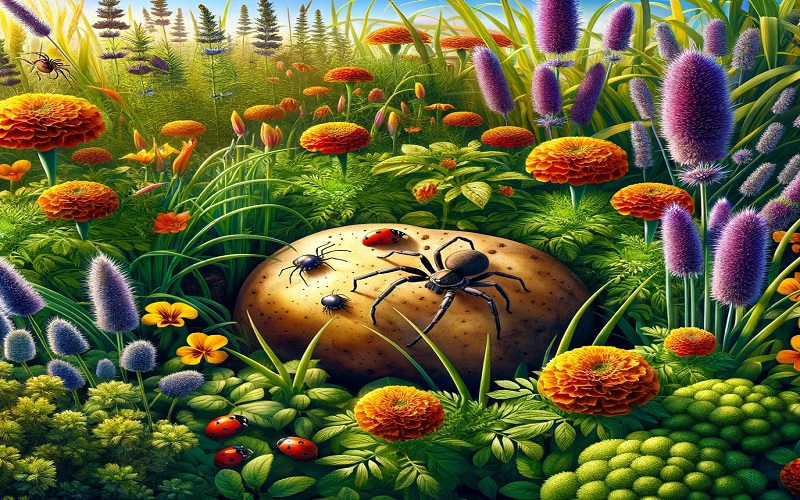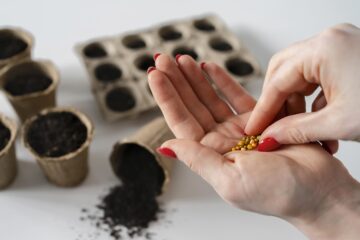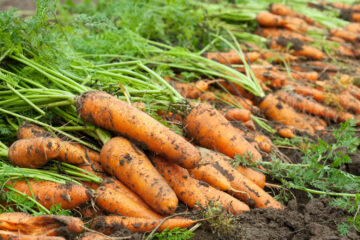Have you ever wondered what natural methods can effectively deter potato garden pests without resorting to harsh chemicals?
Imagine a world where your potato plants thrive without the constant threat of destructive pests.
By exploring the intricate balance of nature, you may uncover simple yet powerful ways to protect your potato garden.
There are intriguing techniques that you can implement to safeguard your precious crops naturally, promoting a harmonious ecosystem in your garden.
Natural Pest-Repelling Plant Varieties
If you want to naturally repel pests in your potato garden, consider planting marigolds, garlic, and chives. These pest-repelling plants are effective at keeping potato bugs at bay.
Marigolds, containing pyrethrum, act as a natural insect repellent, disrupting the attraction and feeding behaviors of pests. The strong scents of garlic and chives emit compounds that deter insects and protect your potato crops.
Crop Rotation for Pest Prevention
Implementing crop rotation in your potato garden can effectively prevent pests and enhance plant growth and productivity. Crop rotation disrupts the life cycle of potato garden pests like Colorado potato beetles, reducing pest populations in the soil and lowering the risk of infestations.
By alternating potato crops with unrelated plants, you can confuse pests and limit their ability to find suitable hosts. Additionally, crop rotation improves soil health, reduces nutrient depletion, and boosts overall plant health.
A diverse crop rotation plan not only controls potato pests but also promotes sustainable gardening practices. Consider incorporating crop rotation into your gardening routine to maintain a healthy garden ecosystem and minimize the impact of pests on your potato plants.
Manual Removal Techniques for Pests
To effectively control pests in your potato garden, consider utilizing manual removal techniques such as handpicking adult potato bugs early in the morning. This proactive approach to pest management can help keep your plants healthy and thriving. Here are some tips for effectively handpicking pests:
- Check the underside of potato plant leaves for egg clusters and remove them by hand.
- Continuously monitor your plants for adult beetles and eggs to catch infestations early.
- Dispose of the pests you collect in soapy water to prevent them from returning.
- Regularly handpick potato bugs and eggs until no more are found to manage infestations naturally.
Implementing these manual removal techniques is a natural and effective way to control pests in your potato garden.
Mulching as a Natural Pest Control Method
Mulching with straw or hay provides a natural barrier that hinders the movement of potato bugs in your garden. This method acts as a physical barrier, making it difficult for the pests to reach your potato plants.
In addition to pest control, mulching helps retain soil moisture, reducing plant stress and making them less attractive to bugs. By suppressing weed growth, mulch also eliminates potential habitats for potato bugs.
Organic mulches like straw decompose over time, enriching the soil and creating an ecosystem less favorable to pests. Embracing mulching as a pest control strategy not only safeguards your potatoes but also promotes the overall health of your garden.
Utilizing Beneficial Insects for Pest Management
As you focus on maintaining a healthy ecosystem in your potato garden, consider incorporating beneficial insects like ladybugs, lacewings, and spined soldier bugs to naturally manage pesky intruders like Colorado potato beetles.
Benefits of Utilizing Beneficial Insects for Pest Management:
- Ladybugs, lacewings, and spined soldier bugs prey on potato bug eggs, larvae, and adult pests.
- These insects help to naturally control the populations of Colorado potato beetles.
- Introducing beneficial insects reduces the reliance on chemical pesticides.
- Nematodes can also aid in pest management by parasitizing and killing potato bug larvae in the soil.
Frequently Asked Questions
What Is a Natural Insecticide for Potatoes?
For potatoes, a natural insecticide is essential. Neem oil, Bacillus thuringiensis, diatomaceous earth, homemade soap spray, and Spinosad products offer effective solutions. Use them to protect your garden from pests without harmful chemicals.
What Can I Plant to Keep Potato Bugs Away?
To keep potato bugs away, plant marigolds, coriander, and tansy. Try interplanting with garlic, onions, or chives. Grow basil, catnip, or mint nearby. Consider companion planting with nasturtiums or radishes. Include dill, fennel, or parsley to attract beneficial insects.
How Do I Keep Bugs From Eating My Potato Plants?
To keep bugs from eating your potato plants, introduce beneficial insects, like ladybugs and lacewings. Use diatomaceous earth as a non-toxic pesticide and rotate crops. Mulch with straw, consider neem oil or microbial solutions for organic pest control.
What Are the Natural Predators of Potato Bugs?
When seeking natural predators for potato bugs, consider ladybugs, spined soldier bugs, and lacewings. They feast on these pests, aiding your garden. Introducing predatory nematodes can also be effective. Attracting birds further helps.
Conclusion
In conclusion, incorporating natural pest-repelling plant varieties, practicing crop rotation, using manual removal techniques, mulching, and utilizing beneficial insects are effective ways to stop potato garden pests naturally.
By implementing these methods, you can create a healthy and thriving garden while minimizing the need for harmful chemicals.
So go ahead, plant wisely, rotate diligently, remove carefully, mulch strategically, and welcome those beneficial bugs to keep your potato plants pest-free!





